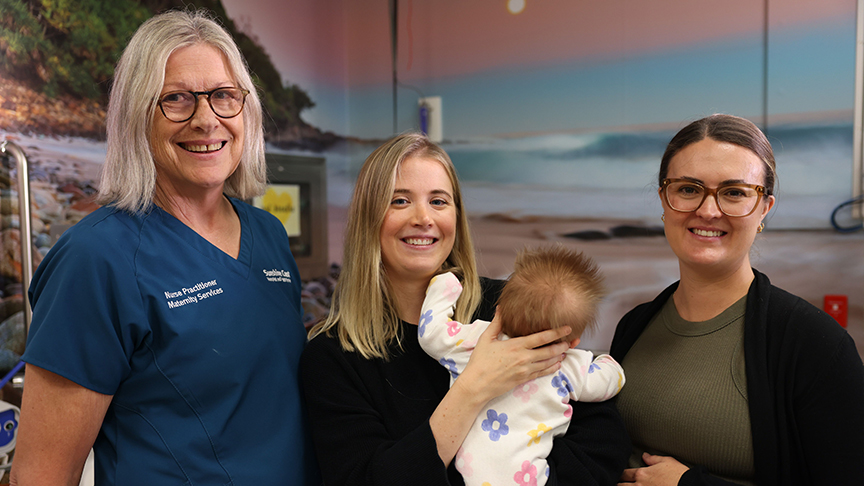
Sunshine Coast Health’s Public Health and Maternity units are collaborating to help protect more newborn babies from Respiratory Syncytial Virus, commonly known as RSV, with local cases increasing by 50% in the last year.
The teams are encouraging families to take up the free vaccine for newborns, which was rolled out for all Queensland babies in April this year.
Public Health Nurse and Midwife Donna Barnekow said the vaccine reduces babies’ chances of being hospitalised with RSV by 80%, and it’s come at an important time.
“We’ve seen significant numbers of RSV infections across all age groups and particularly in our infant cohorts, of babies under the age of one,” Donna said.
“Of those babies who contract RSV infection, up to one third are admitted to hospital on the Sunshine Coast.”
Respiratory Syncytial Virus (RSV) is a common, highly infectious illness that can cause chest infections and breathing issues for babies.
“It effects people of all ages and particularly in newborns where they have very tiny little airways and immature immune systems, it can really impact them.”
The vaccine can be given before the baby goes home from hospital, ensuring they’re protected from day one in the community.
Nurse Practitioner and Midwifery Navigator Kay Bugler said the midwifery team works with families to find the best time to give the vaccine, which is often administered alongside the other newborn injections – Vitamin K and the Hepatitis B vaccine.
“When babies are breastfeeding often that’s usually a really great time to initiate these injections, there’s lots of endorphins around and the baby’s feeding and it’s not really concentrating on anything else except mum and the feed,” Kay said.
Donna said families are relieved to have access to the vaccine, which was previously only short-acting and available to babies with certain conditions.
“This type of vaccine, this technology, is not new. This has been used in the past for high-risk babies, so it’s definitely well researched and well used across the world, and certainly we know it has great results,” she said.
‘Relief’ for Mums
Expectant Sunshine Coast mum Lauren said it’s been an obvious decision to get her second baby vaccinated, after the distressing experience of her first son being hospitalised with RSV.
He was almost one year old when he contracted the illness and was struggling to breathe.
He was admitted to hospital, where he was treated with Ventolin and steroids, and had to be fed via a nasogastric tube.
“It was pretty confronting seeing such a little person with a tube down his throat really to help him eat, having to sort of hold him down to give him the Ventolin, he was pretty distressed,” Lauren recalled.
Her second baby is due in October, and with the vaccination for newborns now available, she’s taking no chances on history repeating.
“It’s obviously everyone’s decision, but for us it was a bit of a no brainer given how sick my son got so young," she said,
“I wouldn’t want that for my child, or anyone’s child.”
Fellow Sunshine Coast mum Alice was also pleased to be able to protect her baby daughter, after seeing the impacts of RSV on her young son.
“It’s just horrible because they’re in so much pain," she said.
“It’s really quite heartbreaking to see them so upset and to only be able to provide that physical contact and comfort for them.”
She said he was lucky to not need hospitalisation, but was still too sick to go to daycare for around three weeks, meaning significant time off work for her and her husband.
When her daughter was born, she said it was a clear choice to get the vaccination and safeguard her against a severe case of the virus.
“The injection is really just a fleeting moment, and hopefully it safeguards them for a longer period of illness in the future.”
For more information, expectant mothers should contact their Health Provider for further information.